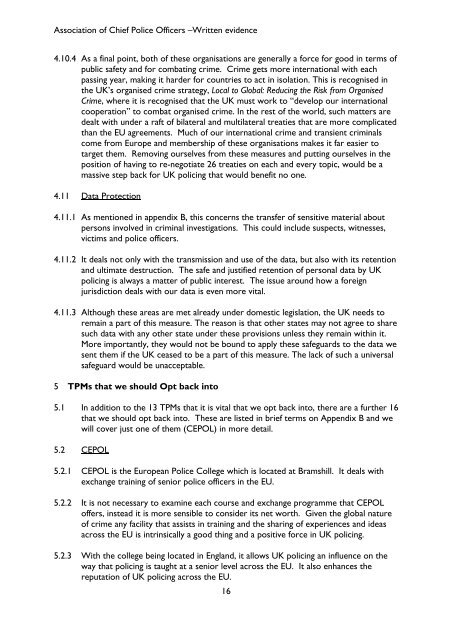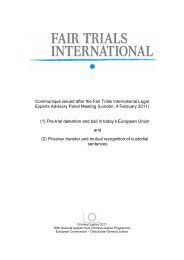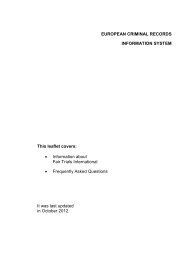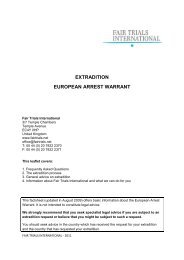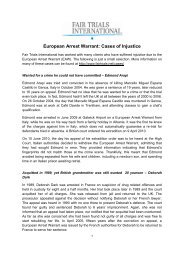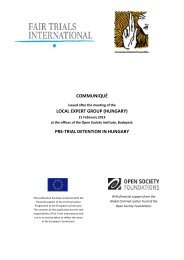The Association of Chief Police Officers - Parliament
The Association of Chief Police Officers - Parliament
The Association of Chief Police Officers - Parliament
You also want an ePaper? Increase the reach of your titles
YUMPU automatically turns print PDFs into web optimized ePapers that Google loves.
<strong>Association</strong> <strong>of</strong> <strong>Chief</strong> <strong>Police</strong> <strong>Officers</strong> –Written evidence4.10.4 As a final point, both <strong>of</strong> these organisations are generally a force for good in terms <strong>of</strong>public safety and for combating crime. Crime gets more international with eachpassing year, making it harder for countries to act in isolation. This is recognised inthe UK’s organised crime strategy, Local to Global: Reducing the Risk from OrganisedCrime, where it is recognised that the UK must work to “develop our internationalcooperation” to combat organised crime. In the rest <strong>of</strong> the world, such matters aredealt with under a raft <strong>of</strong> bilateral and multilateral treaties that are more complicatedthan the EU agreements. Much <strong>of</strong> our international crime and transient criminalscome from Europe and membership <strong>of</strong> these organisations makes it far easier totarget them. Removing ourselves from these measures and putting ourselves in theposition <strong>of</strong> having to re-negotiate 26 treaties on each and every topic, would be amassive step back for UK policing that would benefit no one.4.11 Data Protection4.11.1 As mentioned in appendix B, this concerns the transfer <strong>of</strong> sensitive material aboutpersons involved in criminal investigations. This could include suspects, witnesses,victims and police <strong>of</strong>ficers.4.11.2 It deals not only with the transmission and use <strong>of</strong> the data, but also with its retentionand ultimate destruction. <strong>The</strong> safe and justified retention <strong>of</strong> personal data by UKpolicing is always a matter <strong>of</strong> public interest. <strong>The</strong> issue around how a foreignjurisdiction deals with our data is even more vital.4.11.3 Although these areas are met already under domestic legislation, the UK needs toremain a part <strong>of</strong> this measure. <strong>The</strong> reason is that other states may not agree to sharesuch data with any other state under these provisions unless they remain within it.More importantly, they would not be bound to apply these safeguards to the data wesent them if the UK ceased to be a part <strong>of</strong> this measure. <strong>The</strong> lack <strong>of</strong> such a universalsafeguard would be unacceptable.5 TPMs that we should Opt back into5.1 In addition to the 13 TPMs that it is vital that we opt back into, there are a further 16that we should opt back into. <strong>The</strong>se are listed in brief terms on Appendix B and wewill cover just one <strong>of</strong> them (CEPOL) in more detail.5.2 CEPOL5.2.1 CEPOL is the European <strong>Police</strong> College which is located at Bramshill. It deals withexchange training <strong>of</strong> senior police <strong>of</strong>ficers in the EU.5.2.2 It is not necessary to examine each course and exchange programme that CEPOL<strong>of</strong>fers, instead it is more sensible to consider its net worth. Given the global nature<strong>of</strong> crime any facility that assists in training and the sharing <strong>of</strong> experiences and ideasacross the EU is intrinsically a good thing and a positive force in UK policing.5.2.3 With the college being located in England, it allows UK policing an influence on theway that policing is taught at a senior level across the EU. It also enhances thereputation <strong>of</strong> UK policing across the EU.16


